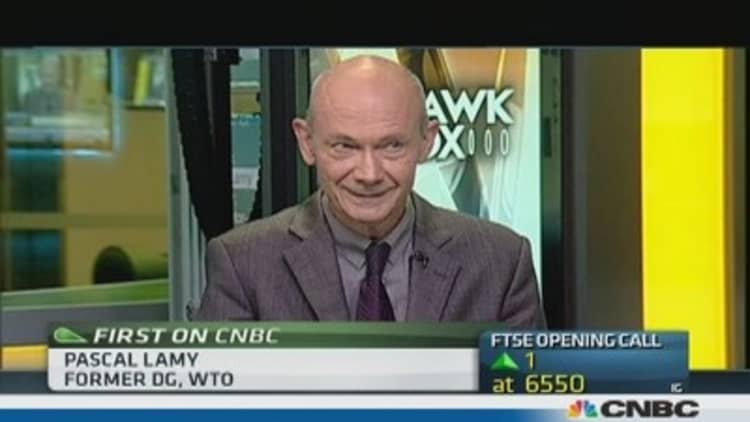
The world needs to move towards toward a more balanced global financial system where the U.S. economic policy and its currency are not so dominant, Pascal Lamy, the former director-general of the World Trade Organization (WTO), told CNBC on Wednesday.
"I personally believe that long-term it will happen [that] the international monetary system will be more balanced than it is today," Lamy told CNBC Europe's "Squawk Box" on Tuesday.
Lamy's comments come as the political impasse over the U.S. government's borrowing limit and funding continued, with less than 24 hours before a deadline to raise the debt ceiling or risk a debt default.
The failure of Republican and Democrat lawmakers to reach an agreement has not only caused the U.S. government to undergo its first partial shutdown in 17 years, but has also created global market volatility, prompting China to call for a new "world order" and the replacement of the dollar as global reserve currency.
(Read more: Markets trust Washington, but for how long?)
Lamy said he could foresee a world where the U.S. dominance in global financial markets would be diminished and China's currency would have greater global prominence as the country gradually liberalized its trade. Recent examples of China's move towards openness include launching a currency swap deal with the euro zone last week and announcing Tuesday that it will open up its capital markets for British investors.
"The (yuan) renminbi will become convertible – don't ask me when --and there will be a rebalancing of this and the U.S. privilege of printing money will relatively diminish in the future," Lamy said.
"This will lead, probably, to a more stable world economy. It will take time but I think the next big step is the renmimbi becoming convertible through various bilateral agreements. Long-term, I think this is a good thing," he added.
As the deadlock continued this week, an English-language commentary published by China's state run news agency Xinhua said it was "perhaps a good time for the befuddled world to start considering building a de-Americanized world."
The piece noted how the "current wranglings" had "again left many nations' tremendous dollar assets in jeopardy and the international community highly agonized."
China is particularly exposed to those "wranglings" over U.S. economic policy as it has $3.66 trillion in foreign exchange reserves to stop its currency appreciating against the dollar, which would make its exports more expensive. The country is the largest foreign holder of U.S. Treasurys, with $1.3 trillion in holdings, according to the U.S. Treasury Department, and is nervous about any possible debt default.
(Read more: As China's foreign reserves surge, are currency wars back?)
Lamy believed it was highly unlikely that the U.S. would default although there was a "tiny little probability" that it could not fulfill its debt obligations. If it did, it would be "terrible devastation for the rest of the planet," he said.
"The gridlock of short-term politics can damage long-term global issues and that's what we're trying to address," he added.


